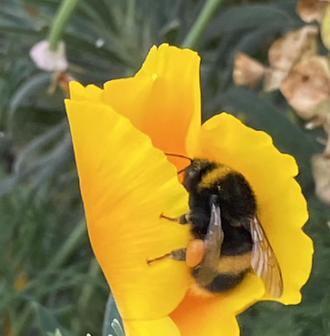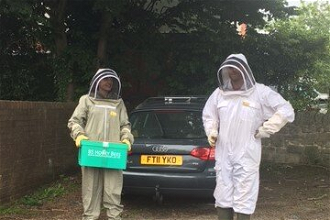Honey bees do not help wild bees

Bee on yellow poppy, St Thomas' Hospital garden, London 2022. Image ICN/JS
Bees have a warm place in our hearts. Since ancient times humans have enjoyed the products of bees, causing a culture to grow up around them. So it is no wonder that the Bible contains many references to bees (66 apparently), or that we Catholics have not one but several patron saints of bees and beekeeping, including St Bartholomew, St Valentine, St Abigail and St Ambrose.
You may have heard of the legend involving St Ambrose. As an infant, it is believed that a number of bees hovered over the head of the saint. They left him unharmed with honey on his head!
Saint John Chrysostom is quoted as saying "The bee is more honoured than other animals not because she labours, but because she labours for others."
I'm sure that most of us remember the passage in the Old Testament where Samson kills a lion and leaves the body there. When he comes back to it, a swarm of bees has taken over and there is now honey in the lion (Judges 14).
Bees symbolise many things in Christianity, including chastity, the resurrection and Christ's attributes of industriousness, strength, wisdom and perseverance.
But the Encyclical Laudato Si' reminds us that "It is not enough, however, to think of different species merely as potential "resources" to be exploited, while overlooking the fact that they have value in themselves" (paragraph 33) and "Disinterested concern for others…attune us to the moral imperative of assessing the impact of our every action and personal decision on the world around us" (paragraph 208).
A vital role
Bees play an essential role in the world. They pollinate flowers to allow fruits and vegetables to grow. They also work as a bio indicator, showing us changes in our environment. Unfortunately, bees are mostly recognised for their products: honey, beeswax and so on, while we forget how important they are for us. Albert Einstein is reported to have said that if all bees suddenly vanished from the planet, all people on earth would only have four years left to live. That is an exaggeration, but human nutrition would certainly suffer, and so would the planet.
Since 1900, the UK has lost 13 species of bee, and a further 35 are considered under threat of extinction (Salt of the Earth). Also, over 700 North American bee species are now at risk, and 40 percent of invertebrate pollinators face extinction (Friends of the Earth). The decline in populations is thought to be because of changes in land use, which have led to habitat loss. Other issues affecting bees include disease, pesticides, pollution and climate change.
Some of the best ways to help bees are to go organic, to plant flowers, to rewild and to preserve natural wild areas, not to keep domestic bees.
The World Wildlife Fund recommends eating less honey as the best way of helping bee populations.
Ecological scientist Prof Jeff Ollerton says that it would be a mistake to attempt to reverse the decline of wild pollinators such as bumblebees, hoverflies and butterflies by encouraging honey bees. "If honey bees become the central focus of such strategies (and funding), due to confusion in the minds of the public, MPs, policy makers, businesses, the media and other influential bodies, then wild pollinators would lose out". 1* 2* 3*
What has happened in China should be a strong warning
The introduction of European honey bees in China has led to the transmission of many contagious diseases that have devastated local bee populations, which in turn has increased the use of pesticides, making a vicious circle of destruction.
According to the South China Morning Post, 12-6-2017, "an estimated 80 percent of China's native Honey Bee population has been lost since the introduction of European honey bees in the 19th century".
Honey bees do not help wild bees
Wild bees are dying out at a frightening rate. Domestic bees do not help. On the contrary, honey bees threaten wild bee populations. They can cause disruption and spread diseases and they compete with wild bees for natural resources.
The more we depend on domesticated honey bees, the greater the risk to wild pollinators. And wild pollinators are essential. Should they die out, and a disease decimate the honey bee population, we will be in serious trouble.
Native bees are often better pollinators than honey bees. Honey bees are less or much less efficient than wild, native bees at pollinating tomatoes, eggplants, pumpkins, watermelons, blueberries, cranberries, peppers, melons, cherries and other plants.
Domestic Bees
Honey bees are like livestock, not wildlife. They are domesticated, selectively bred and hybridised. Honey is sold to make money, not to help bees.
Bees are now subject to intensive farming. They are not treated naturally, but are made to perform according to the farmer's profit-motivated wishes. The treatments they undergo cause them welfare problems.
Bees make combs out of wax to contain their eggs and to store pollen and honey. They have to visit 30 million flowers to produce just one pound of wax. When beekeepers take the wax, they are damaging or destroying the bees home system.
Suffering
Bees are flown around the world according to demand. In one case in 2022, nearly 5 million bees died when Delta transported them to Georgia, USA. They died from starvation and being baked alive on the airport tarmac.
People often disregard bees as barely conscious creatures. But bees have a functioning nervous system that enables them to feel suffering and pleasure.
They are mainly exploited for the extraction of honey, of which millions of pounds are sold every year. To produce a single teaspoon of honey, it takes twelve worker bees an entire lifetime. Bees have to collect nectar from two million flowers to make one pound of honey. They labour for countless hours on the production of this sweet substance to feed their young and for their own future nourishment. Humans take the honey for their own use and often replace it with sugar water that is unfit to sufficiently nourish the bees.
Queen bees may have their wings or legs cut off. Semen for artificial insemination is obtained by crushing the heads of drones. It is then injected into the Queen.
Bees are subservient to the wishes of the keeper at all times. They may be killed when the honey is harvested because it's cheaper than feeding the bees throughout the winter. The stressful conditions inherent in factory farming weaken the bees' immune systems, making them more susceptible to disease, which they then may pass on to wild bees.
Honey is an unnecessary food and can be replaced by plant-based items. Furthermore, any medicinal qualities it may have can be substituted by herbal medicines.
Church projects involving bees are sometimes unfortunately focussed on beekeeping. But I have found one bee project that is amazing. The Diocese of Portsmouth and the Diocese of Winchester have organised a schools' project "Bee Inspired" which I can't praise highly enough. The focus was on educating children on what is needed to help wild pollinators survive and thrive, and on enabling children to put their knowledge into practice by planting bee-friendly plants and creating bee-friendly gardens. What a brilliant example of what Dioceses can do to tackle the environmental crises!
LINKS
https://cofewinchester.contentfiles.net/media/assets/file/Bee_Inspired_Newsletter_July2019.pdf
1* www.cam.ac.uk/research/news/think-of-honeybees-as-livestock-not-wildlife-argue-experts
2* https://theconversation.com/keeping-honeybees-doesnt-save-bees-or-the-environment-102931
Virginia Bell is a member of Laudato Si' Animators UK


















